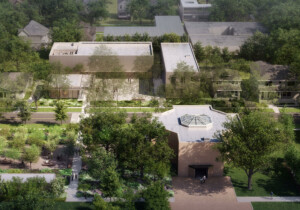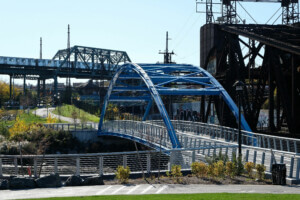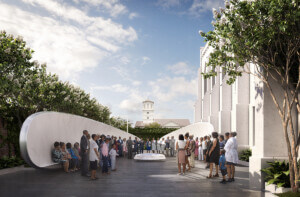The Houston Chronicle has reported that earlier this week the Harris County Commissioners Court formally green-lit a plan to convert Quebedeaux Park and the entire downtown Houston block that surrounds it into a landscape of remembrance, centered around a quartet of markers that each represent individual Black Americans murdered in Harris County during the Jim Crow era.
The lynching markers will be donated by the Montgomery, Alabama-based nonprofit Equal Justice Initiative and were previously approved for installation at a downtown Houston site by County Commissioners in 2019. However, under the just-approved proposal spearheaded by Precinct 1 Commissioner Rodney Ellis, the markers have a definite home and will potentially be joined by art installations, a water feature, space set aside for public education events, and permanent displays with information about “the local history of racial and social inequality” per the Chronicle. Ellis also told the Chronicle that a mural by Nigerian artist Chief Jimoh Buraimoh and a memorial of slavery-abolishing former Mexican president Vicente Guerrero are also under consideration.
“As the divides between us appear to grow wider due to many foundational biases — including structural racism, systemic discrimination and political polarization — creating a healing place that is dedicated to recognizing our shared past while finding paths to unity and community is needed to build a stronger future for Harris County,” said Ellis in a statement shared by the Chronicle.
As Houston Public Media reported last year, the markers will commemorate four Black men lynched within Harris County limits between 1890 and 1928: John Harris, who was targeted and shot by a mob of prominent county politicians and law enforcement officials in 1890; Bert Smith, who was jailed on rape accusations and awaiting trial but was forcefully removed from the jail and hung by a mob of white vigilantes in 1917; John White, who was set afire and perished in the cell of another county jail, and Robert Powell, who, in a notorious act of violence that made national headlines, was kidnapped from a county hospital and hung from a bridge just ahead of the Houston-hosted National Democratic Convention of 1928.
The selection of Quebedeaux Park as the installation site of the markers and a larger memorial/landscaped educational space is not incidental. The park is located in the civic heart of Houston opposite the 1960s-era Harris County Family Law Center and the historic Harris County Courthouse. Ellis hopes that the highly visible location of the memorial will further drive home themes of racial injustice.
“We picked this site downtown to make the point that these people didn’t have due process,” Ellis told the Chronicle last year. “They didn’t have a public defender. They didn’t have equal protection under the law.”
Centered around a small fountain and featuring plenty of benches, shade-providing trees, and tidily-kept plantings, the small but busy Quebedeaux Park is named in honor of the late Walter A. Quebedeaux, a former Director of Air and Water Pollution Control with Harris County who “labored hard and often fought with powerful opposing interests to untangle and remedy problems caused by neglect of our natural resources” according to a county description of the park, which is located in Ellis’s precinct.
Cost estimates and a timeline for the just-approved planned memorial have not yet been established.











